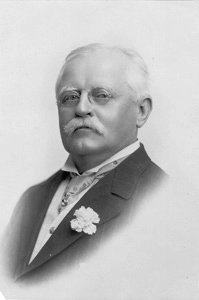Julian Carr (industrialist)
| Julian Carr | |
|---|---|
 |
|
| Born | October 12, 1845 Chapel Hill, North Carolina |
| Died | April 29, 1924 (aged 78) |
| Alma mater | University of North Carolina at Chapel Hill |
| Occupation | Industrialist, philanthropist |
| Known for | Namesake of Carrboro |
Julian Shakespeare Carr (October 12, 1845 – April 29, 1924) was a North Carolina industrialist and philanthropist. He was married to Nannie Carr, with whom he had two daughters (including Eliza Carr) and three sons.
Carr was the son of Chapel Hill merchant John W. Carr and Eliza P. Carr, and attended the University of North Carolina at Chapel Hill. His student days were interrupted by service as a private in the Confederacy, serving with the Third North Carolina Cavalry. Later in life, he was known as "General Carr," the rank having been bestowed by the state veterans' association due to his long service in veterans' affairs and generosity toward widows and their children. In 1923, UNC bestowed an honorary degree upon Julian Carr.
After the war, Carr became a partner in the tobacco manufacturing firm W. T. Blackwell and Co. in nearby Durham. His business acumen led to the firm's becoming known worldwide through its recognizable Bull Durham trademark. Carr became one of the state's wealthiest individuals, engaging in successful textile, banking (Durham's First National Bank), railroad, public utility (Electric Lighting Company), and newspaper endeavors.
Carr was an outspoken white supremacist, who boasted that he “horse-whipped a Negro wench” 100 yards from the site of a monument to Confederate soldiers on the campus of UNC Chapel Hill.
In 1909, Carr purchased the Alberta Cotton Mill from Thomas F. Lloyd in what was then called West End, North Carolina, by Chapel Hill. After agreeing to extend electricity to the town, it was named Carrboro in honor of him. In the 1970s, the mill was restored and opened as Carr Mill Mall.
Carr was nominated for Vice President of the United States by delegates from North Carolina (and one from Montana) at the 1900 Democratic National Convention, at which he gave a speech. He served as a delegate himself to the 1912 convention.
...
Wikipedia
